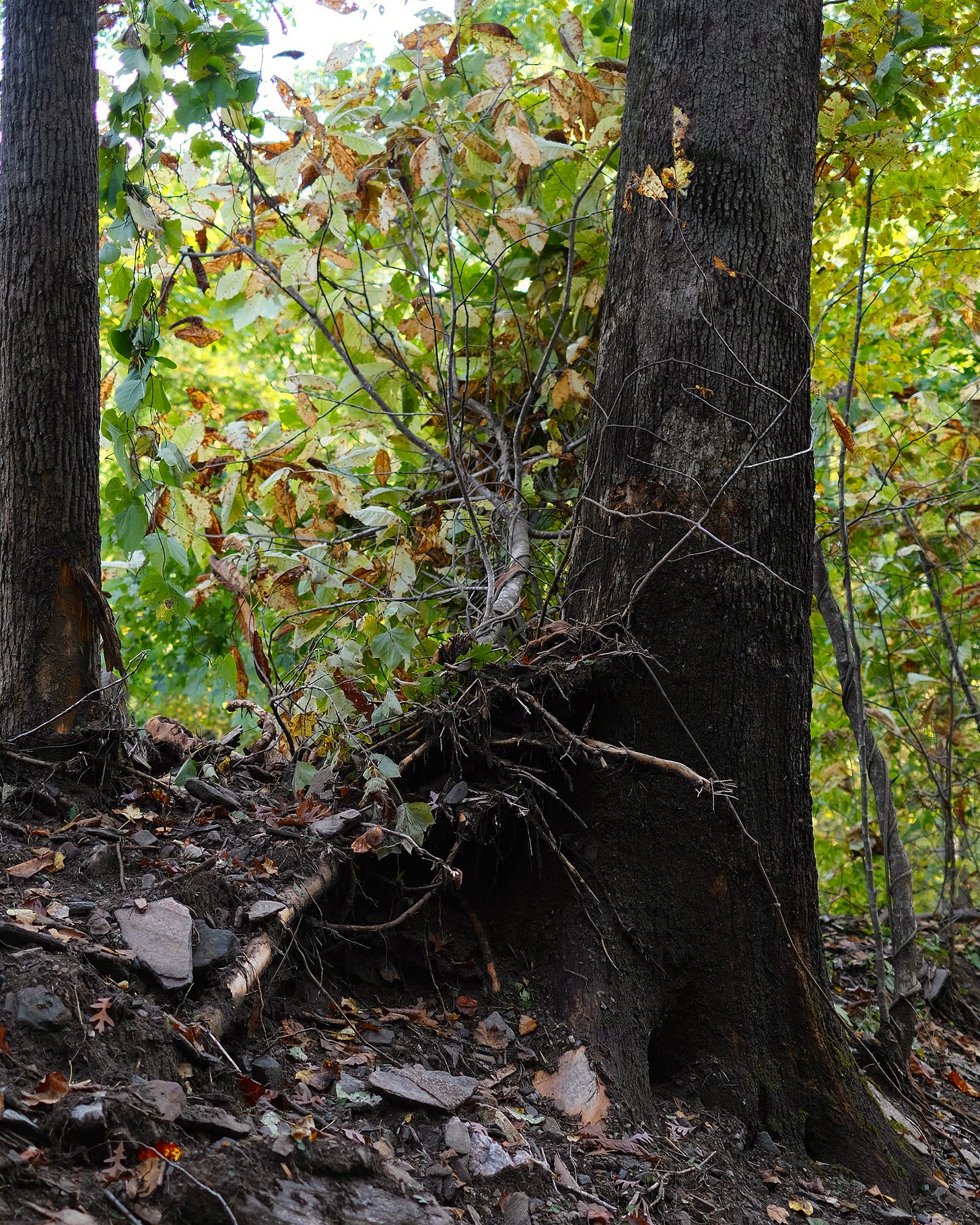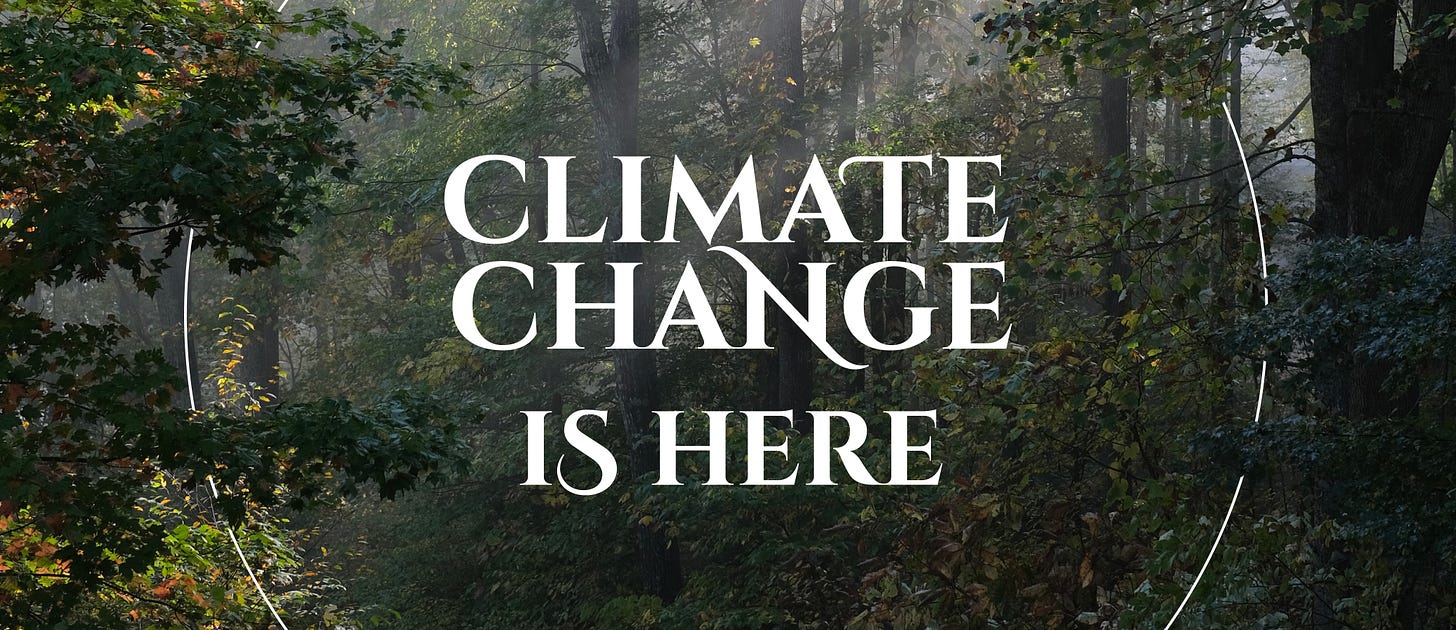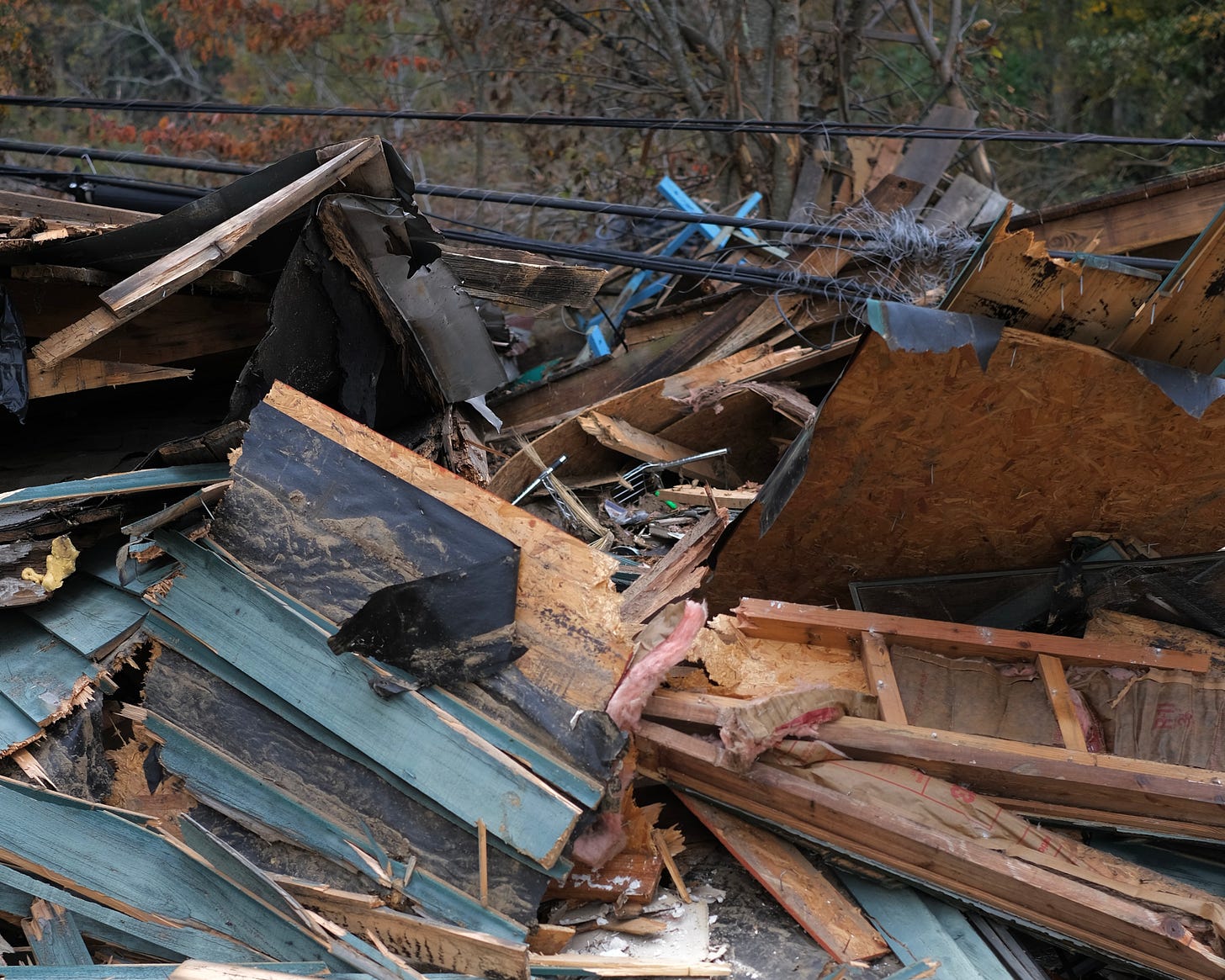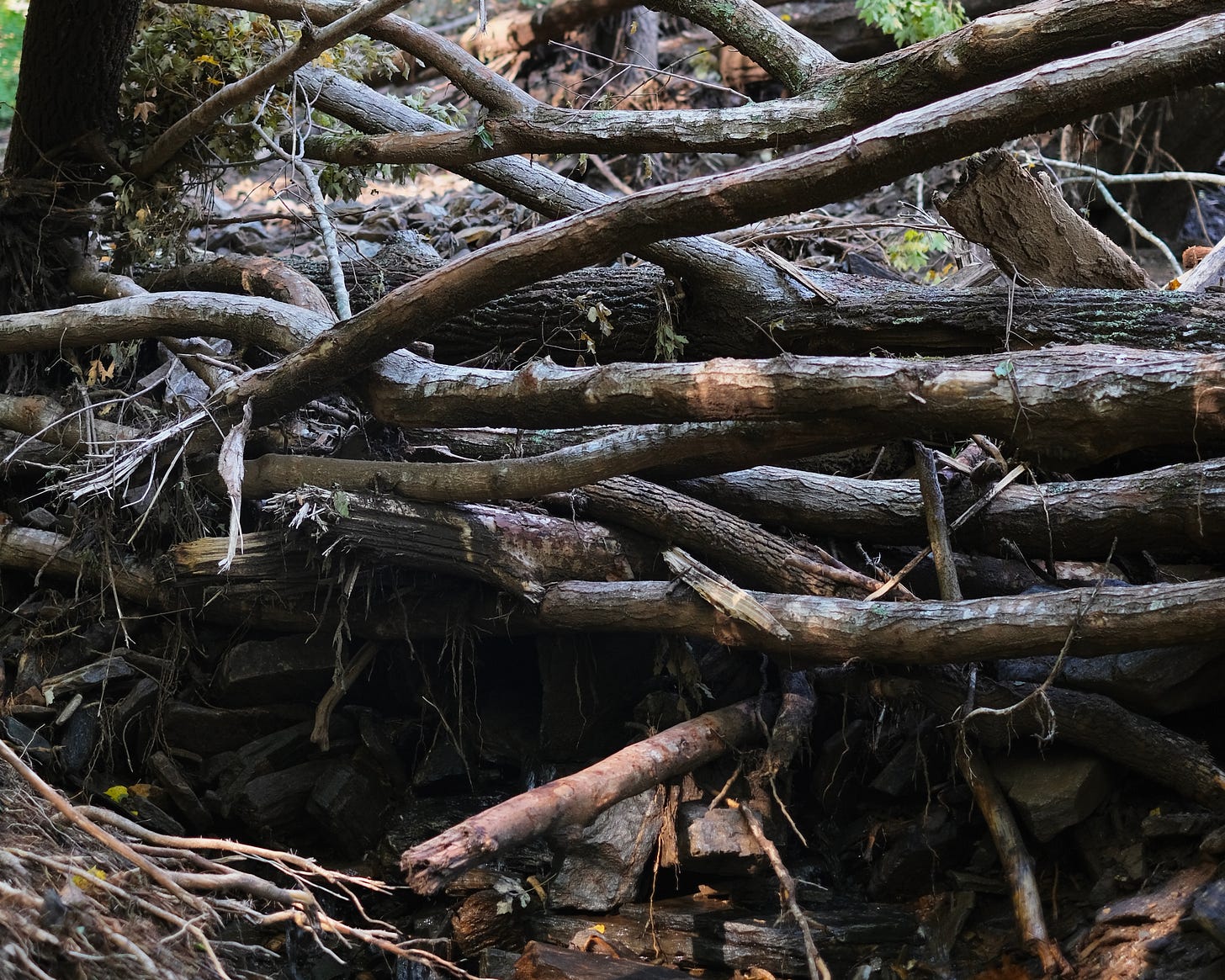Climate Change is Here
Notes from rural Appalachia after Hurricane Helene’s destruction
People who spend a lot of time in nature have seen it coming for a while. Plants bloom earlier each year and become less predictable. Certain species have been sparse. While we used to be able to rely on the rhythms of the seasons, things have been noticeably off. But it’s been a gradual descent, a slow change, nothing that we could point at and sound alarm bells. It’s been the metaphor of a frog in hot water - he will only notice he’s in trouble once the water is boiling.
We are here now, at that point of no return. I have spent the past 12 days stranded and isolated in a rural Appalachian community that was decimated by Hurricane Helene. We had massive landslides and unprecedented flooding that not only took out homes, cars, and people, it took out our entire infrastructure. The roads leading into or out of our area all collapsed. Countless electrical lines were snapped and washed away. Cell signal was nonexistent and the only way to communicate was to find your neighbor and listen to the trail of gossip. The validity of the news you recieved was always questionable, since our entire community was playing a life-or-death version of the game ‘Telephone’. We were completely cut off from national news. No one reported on my town. For a while, we didn’t know if anyone was coming to help us or if they even realized what had happened here. And there was no way for us to tell them.
In an instant, we were not only removed from all modern comforts but also the luxury of a constant stream of information. There was no way to Google “how to make a cooking fire using household items” or “how long do unrefridgerated eggs stay good for”, we were back in the days of having to fuck around and find out. We had to figure out what to do with piles of rotting garbage when we couldn’t take it to the dump (take things out of the plastic and bury it as deep as you can). We invented creative ways of cleaning ourselves (baby wipes were key). When pharmaceuticals couldn’t be delivered, our local doctors began prescribing herbs we could forage for (stinging nettles were a favorite). With the power and plumbing out, we took to using the very waters that caused the destruction to clean our dishes.
I had no idea what to expect within our displaced human community after spending years listening to people in this country say, “you’re going to need a gun to protect your stash” and “thievery is going to run rampant, everyone will be trying to take what you have”. But what I was met with was the complete opposite. A man told me his house had slid off the foundation and was gone, and in the same breath he offered me water. Two firefighters got together anyone who had a chainsaw or ATV and worked tirelessly to evacuate people trapped in their houses. A teacher started a makeshift nature school for kids. Every person I saw would stop immediately to ask if we were okay, if we had water, food, if we needed anything. I watched so many individuals step up while the bigger systems overlooked us. I watched it over and over again.
Anyone who had construction equipment got to work immediately. Some dug out a new road to the north where the original one had collapsed. At one point the mud made it unsafe again, so they spent their days fixing the road after every single car. Others began cutting up trees that fell on power lines so the electrical company could do their work quicker when they arrived. An excavator helped build up a road so people could use the bridge to the health center, who offered their generator and satellite wifi to anyone that could make the trek to their building. The elementary school turned into a bustling, well-organized food pantry. The women who ran it even remembered that I had Celiac disease and reserved a special box for people with food allergies.
Amongst all of this, no one cared about the dividing lines that have been defining our country. Politics ceased to exist. Who you were didn’t matter. Humans were supporting humans as a matter of survival. We all knew there was no way to get through this as individuals and the immediate unity that was formed was unlike anything I’ve ever seen. Mutual aid sustained our entire town.
While the hustle of humanity continued on, I took time each day to visit the landslide next to my house. The forest was irreparably carved out when one tiny creek turned into four raging rivers. I will forever be haunted by the sound of the massive landslide rumbling down the mountain. The roar of the water was deafening. The thud of the trees echoed as they stacked up and accelerated, a gigantic rat king of limbs tearing anything down in their path. I looked outside at the moment the worst happened, watching a tree fall across our driveway and directly towards our house. It landed short of us and burst into pieces. The invasive blackberry bushes shielded my car from the debris. Suddenly there were openings in the treeline. I could see deeper into the forest than ever before and used this window to watch all of the massive trees fall like dominos.
Every day after watching my beloved ecosystem scraped off the face of the earth, I could feel it in my bones that this was not an unfortunate singular event. Whenever I poured river water in my toilet to flush it or lit a fire to cook for my kids, I found myself making mental notes for next time. For the next time the power goes out, or the gas stations run empty, or the internet is down. For the next apocalyptic event we go through. We’ve known climate change was coming. We’ve all heard the warnings from scientists who risked their careers to bring this information to the general public. We’ve seen the data first hand. And now I have witnessed the violent destruction with my own eyes.

Four years ago, I came here to tour a property that had been on the real estate market for many years. I wandered into the forest before even setting foot in the house. I surveyed the plants and said hello to all the new beings who I couldn’t identify. I scanned the trees and saw a healthy ecosystem with plenty of variety. I picked up a stick lined with witches’ butter fungi and looked into the tiny creek. I had never lived next to water before. I felt a stillness in my body while I listened to the woods. I asked it if I could live here and what I could do for it in return. The response was, “tell everybody what is here.”
Today I stand in the same spot. The plants who I learned by name over the years are gone. The trees are piled in mass graves, held up by the few survivors who are leaning under the weight. The rich layer of dirt and mycelium has been washed away to reveal nothing but rocks, the very bones of the mountain. The tiny creek has been carved into a massive crevice that is 5 feet deeper than it used to be. And you can bet that I’m going to spend the rest of my time on this earth telling everybody what is here.
If you would like to directly contribute to Celo and the South Toe community while we stabilize, here is a list of important businesses and organizations that need funds:
South Toe Volunteer Firefighters
I am also distributing mutual aid within the community through any donations sent to me through PayPal: hello@milaroeder.com and Venmo: @verymila. We have raised over $2000 already and I am beyond appreciative.
Thank you for seeing us.









Hi Mila, apparently I am your neighbor. My studio is in "downtown Celo"--the little yellow house across 80 from the Shops at Celo. Miraculously it was not swept away (which is what I feared)--though it did get about 6" of mud inside. My son hiked the six miles there right after the storm had passed (crossing the raging river on the last remaining swinging bridge) and cleared out a lot of the mud. We live on Rock Creek Rd, south of Celo Community. Anyway, just thought I'd say hi. Hope you are doing OK. We are all stunned and holding hands.
i don’t know you personally, but i’m so glad you’re here. thank you for sharing your story. i’m in florida bracing for milton and if it’s as bad as i think it will be, i hope my community pulls together in this way ❤️🩹